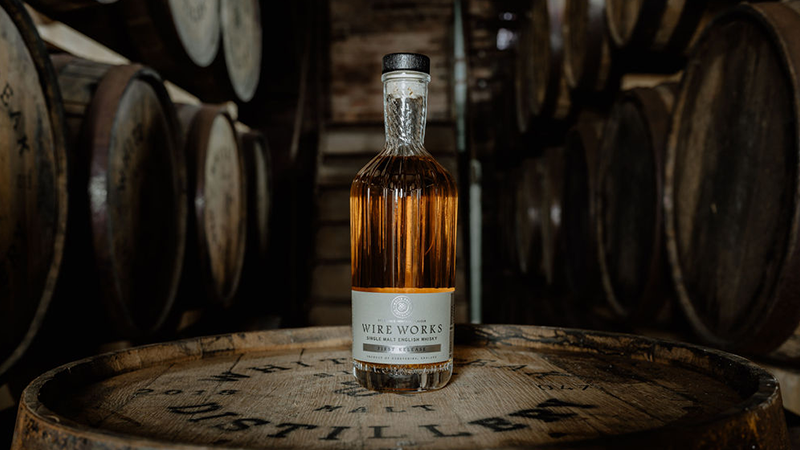It’s Time to Take Notice of English Whisky

[ad_1]
It was a trip to Tasmania in 2014 that sparked Dr. Abbie Neilson and Chris Jaume’s interest in making whisky. “We witnessed firsthand the exciting growth of the Australian whisky scene off the back of a small Tasmanian distillery gaining international recognition for their whisky,” Neilson says of their trip to Sullivan’s Cove. Eight years later, Neilson and Jaume run Cooper King Distillery in Yorkshire, distilling English-grown heritage grain (Maris Otter) using a 900-liter Tasmanian copper pot still that is insulated with paint developed by NASA (usually used to coat the tips of space rockets).
Upon their return from Tasmania — and with the dream of running their own distillery turning into reality — Neilson and Jaume created the first English whisky map back in 2016. Back then, there were just 16 distilleries operating around the country and a mere three with mature whisky to sell. Now, with 40 English whisky distilleries in operation — the oldest having been distilling for 20 years — it’s predicted that by 2023, English whisky sales will rise by 418 percent compared to 2019.
The English whisky scene has never been so vibrant — a pleasing proposition for consumers. With the majority of companies being small, independent craft distilleries, the “founder-run” nature of English whisky-making is a welcome relief from the increasingly corporate world of Scotch. There is also huge variety in English whisky, from production techniques to whisky-making philosophies. Take, for example, the Oxford Artisan Distillery, whose whisky is made with ancient heritage grains (the only in the world to use them); or East London Liquor Company, which has aged its rye whisky in a mixture of London brandy, Hungarian oak, regenerated oak, and American oak; or Bimber Distillery, which ages its juice in ex-Islay peated quarter casks.
Don’t Miss A Drop
Get the latest in beer, wine, and cocktail culture sent straight to your inbox.

It’s worth noting, though, that English whisky isn’t new — records exist of distilleries in London, Liverpool, and Bristol — but when St George’s Distillery in Norfolk bottled its first whisky in 2009, it was the first time in a century that single malt whisky had been made in England. A cool 13 years later, in May 2022, the English Whisky Guild (EWG) was launched with 15 founding member distilleries, including Cooper King.
Similar to the regulating body Scotch Whisky Association (SWA), which operates in Scotland to protect Scotch whisky, the EWG has been set up to help protect, encourage, and showcase the whiskies coming out of England while also ensuring that drinkers are getting the quality they’re paying for. Its first step will be to submit the region’s first Geographical Indicator (GI) for whisky.
When it comes to making English whisky, distillers are freer than their Scottish counterparts when it comes to rules and regulations. “With a similar climate to Scotland, English whisky-makers are not only able to learn from the history and heritage of Scotch whisky, but benefit from the freedom to create without the restrictions of what can often be a very traditional category,” explains Steve Gibson of The Lakes Distillery. Using the SWA guidelines as its starting point, the team at The Lakes Distillery also takes inspiration from techniques used in the production of Cognac, wine, and perfume to make its award-winning whiskies.
The distillery also takes a proactive approach to maturing its whiskies, inspired by the élevage process often used in Cognac. Rather than sealing its casks and simply waiting to blend the result, the team regularly samples every cask, frequently moving casks’ locations or transferring spirits between different barrels to evolve an array of intriguing layers of flavor.
Born out of a desire to make one of the finest sherry cask-matured whiskies in the world, The Lakes Distillery may look to Scotland for distillation techniques, but its philosophy, says Gibson, is more closely aligned with the workings of Japanese distilleries. “Japanese whisky leans upon the traditions of Scotch but retains an aura of distinctiveness and individuality,” he says. “Its global success is one of the reasons consumers are actively exploring whisky made in countries not traditionally known for the art — including England.”
When Dan Szor, the American-born founder of Cotswolds Distillery, launched his brand in 2014, it was also with the global whisky market in mind. “When we decided to set up the distillery to make premium single malt whisky, the reasoning was not so much based on wanting to become an English whisky producer as it was to become the first-ever distillery in our part of England — the Cotswolds — to produce whisky,” he explains. “Given the lack of English whisky producers at the time, we considered ourselves more as identifying with the growing movement known as ‘World Whisky’ — that is, whiskies produced in non-traditional areas around the world such as Japan, Taiwan, France, Germany, Belgium, Switzerland, Italy, the Netherlands, Sweden, Denmark, Australia, New Zealand, etc. — who share the same renegade belief that you don’t have to be in Scotland to make a great whisky.”

Only eight years later, and the distillery not only has six core expressions, two limited editions, and a single cask program to its name, but it is in the process of building a new and dedicated larger whisky distillery on-site to up its volumes and lay down more whisky for longer-term aging.
For Max Vaughan, co-founder White Peak Distillery in Derbyshire, which recently released its first whisky, quality and variety are what set English whisky apart from more traditional drams. He visited both The Lakes Distillery and Cotswolds Distillery in 2016 as part of his plans to open White Peak and now has two releases under his and fellow co-founder Claire Vaughan’s belts: Wire Works Single Malt and Wire Works Small Batch. For the Vaughans, fermentation and yeast have been key to giving their whisky its identity. “We did test research early on with live brewers’ yeast from local Derbyshire breweries and, allied with 93- to 96-hour fermentation, we found we could produce some great flavors that carry across through distillation,” explains Max. White Peak is also the only English whisky brand making a lightly peated spirit as its core house style, something more characteristic of whiskies from Scotland’s Islay.
With the news that the U.K. is hosting its first ever English Whisky Festival in November this year, it seems 2022 may be the year that more and more people will discover what the category has to offer. For Szor, this is just the beginning: “We expect that English whisky will go from strength to strength — there are already at least 10 distilleries in full-release mode, and more on the way. We are all united in the feeling that we are getting in on something very exciting and long-term in nature, at its very start,” he says. “We are, in effect, creating the groundwork for future generations of English whisky-making.”
[ad_2]




